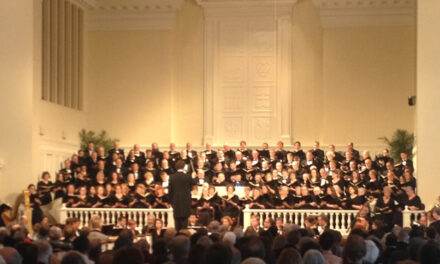It’s 1958 at the start of The Pride, now being produced by Mortall Coile, and the play begins with what appears as domestic normalcy. A married couple, Sylvia and Philip, invite Sylvia’s boss, Oliver, over for drinks. The real scene, however, is just beneath the surface. It’s hard to place a finger on it, but there’s definitely some chemistry going on between the two men in the room. As the play unwinds, Oliver and Philip become engaged in a love affair that, at the time, would have been a criminal offense. Flash forward to 2008 and we’re in an alternate reality. The same actors as before play different characters sharing the same name and same home, but now “the love that dare not speak its name” is suddenly spoken loudly and clearly and on a speaker phone. But it’s not all domestic bliss for the modern day Oliver and Philip, now living together. The story of repression and societal change shifts to a story of self-change and lovers fighting to stay together.
In 1958, Philp (Ryan Brock) works to repress his feelings for the slightly more emotionally open Oliver (played with ease by Jesse R. Gephart, also the director). Sylvia (Paige Purgar) is the wife caught in their inner turmoil, married to a man who is as incapable of loving himself as he is her. The story in 2008 seems to answer the question we didn’t even think to ask: what if these men and woman had been born in a different time? Our 2008 Philip and Oliver are on the heels of a messy breakup. Oliver, a self-described “lost soul,” is addicted to sex with strangers, and not even nice pretty strangers. This time around, Sylvia is the couple’s good friend, doing her best to keep them together. Alexi Kaye Campbell’s play is a clever and, at times, brilliant mix of Noel Coward-esque banter with terse and in-yer-face dialogue. It all climaxes with a shocking Act I closer. Without giving too much away, after the first act, I was surprised and a little baffled the play didn’t come with an adult content warning on the program or in the lobby.
With the assistance of local stage veteran David Henderson as assistant director, actor and director Jesse R. Gephart has created a nuanced and professional quality work. The dual casting works well and allows us to see certain parallels in characterization to the point that the audience needs to work to keep up with which time period is which. Page Purgar was sweet and sentimental as the 50s Sylvia and was then given a chance to be devilishly funny as her modern incarnation. Appropriately, both of Ryan Brock’s Philips were a bit of a stick in the mud, but he worked to make both sympathetic. Gephart showed that casting yourself isn’t always an act of self-indulgence as he performed the dual Olivers as if they were the roles he was born to play. Chris Milner was the most versatile here, playing multiple and diverse smaller roles. Accent work, usually a hindrance and hugely uneven in many Raleigh productions, was directly on point and subtle enough not to distract.
Thomas Mauney has created one of the sharpest sets I’ve seen on the Raleigh stage. The home is sleek and modern, with a slight expressionistic touch as the doors and windows appear to be made with opaque cellophane. It’s all pulled together by a moving Philip Glass-inspired original score by Scott Parks, used primarily during scene transitions when the periods blend together and characters move around like ghosts lost in time. Parks’ moving score is sorely missed, however, during the preshow and intermission. Gephart missed an opportunity here to set the mood for the play, instead leaving the audience alone to awkward silence. But perhaps awkwardness is an appropriate mood for a play that delves into the struggle for gays to be heard and feel normal in a society that still doesn’t want to listen.
The Pride continues through Sunday, March 1. For more details on this production, please view the sidebar.











